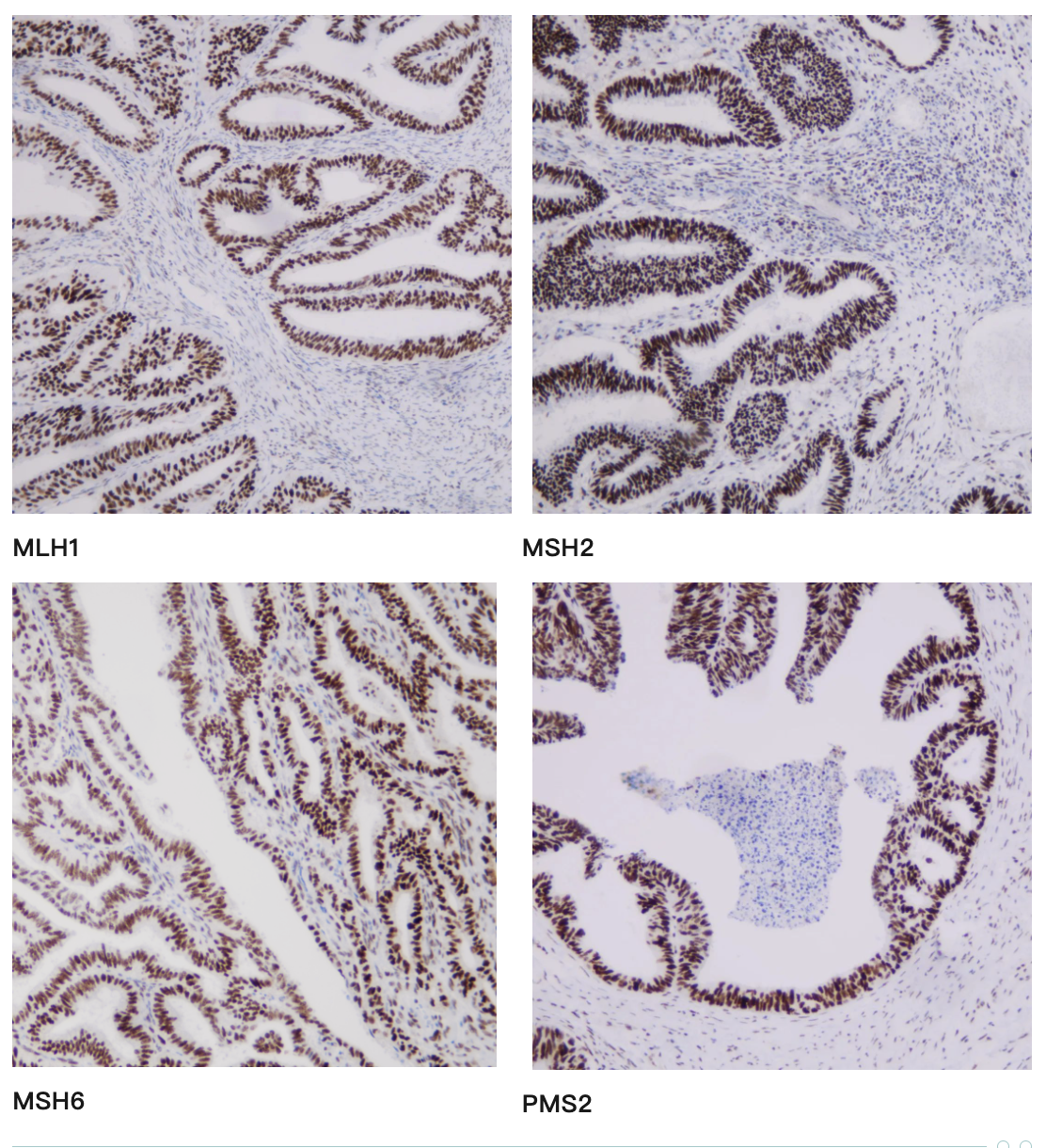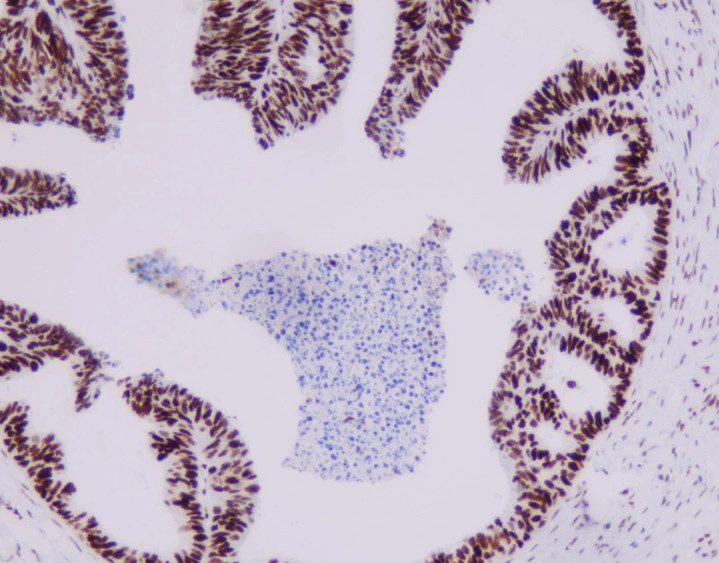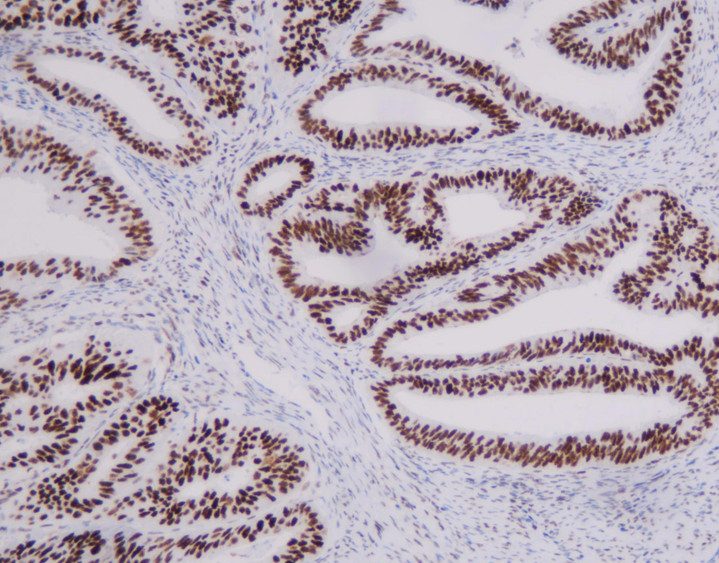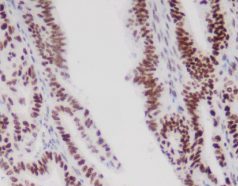Comprehensive Mismatch Repair (MMR) Solution
 2025-05-25
2025-05-25
By admin
Product Highlight: Comprehensive MMR IHC Detection Solution
What Is the Mismatch Repair (MMR) System?
Mismatch Repair (MMR) is a vital DNA repair mechanism that corrects base-pair mismatches during replication, preserving genomic stability. The MMR process involves two major protein families: MutS (MSH2, MSH3, MSH6) and MutL (MLH1, MLH3, PMS1, PMS2), with MLH1, MSH2, MSH6, and PMS2 being key proteins.
Clinical Significance of MMR Protein Testing
1. Lynch Syndrome Screening
Lynch syndrome is an autosomal dominant hereditary condition, linked to MMR gene mutations and a higher risk of colorectal, endometrial, and gastric cancers. Over 90% of Lynch syndrome patients exhibit the dMMR/MSI-H phenotype.
2. Prognosis Prediction
In Stage II colorectal cancer, patients with dMMR/MSI-H have a lower recurrence risk and better survival outcomes. For endometrial cancer, TCGA classification shows the POLE-ultramutated subtype has the best prognosis, followed by MSI-H and CN-L, with CN-H being the worst.
3. Chemotherapy Response Prediction
Stage II colorectal cancer patients with dMMR/MSI-H generally do not benefit from single-agent fluoropyrimidine-based adjuvant chemotherapy.
4. Immunotherapy Response Prediction
dMMR/MSI-H tumors respond well to immune checkpoint inhibitors (ICIs). MMR/MSI status is a predictive biomarker for immunotherapy, recommended by international guidelines.
Challenges in MMR IHC Interpretation
MMR IHC staining faces challenges due to:
- Cytoplasmic staining
- Weak or absent internal control staining
- Tumor heterogeneity
- Pretreatment with chemoradiotherapy
- Rare staining patterns
- Sample type variation
Standardizing and improving MMR IHC testing accuracy is crucial for consistent diagnostic results.
Celnovte’s Complete MMR IHC Detection Solution
Celnovte Biotechnology offers a comprehensive, optimized MMR IHC solution to improve staining quality and support standardization across labs.

Features of the Celnovte MMR Solution
✅ High-Sensitivity Primary Antibody Panel
- Validated monoclonal antibody kit including MLH1, MSH2, MSH6, PMS2
- Batch consistency and enhanced staining uniformity
✅ Specialized Detection System
- High-sensitivity polymer-based secondary detection system
- Specifically optimized for MMR staining
✅ Standardized Staining Protocols
- Customized protocols for each antibody’s properties
- Improved reproducibility and diagnostic confidence
✅ Integrated IHC Platform Compatibility
- Compatible with automated IHC stainers
- Optimized from reagents to platform
🖼️ Staining Examples
- MLH1: Clear nuclear staining, minimal background
- MSH2: Strong and specific signal in tumor and control cells
- MSH6: High sensitivity and excellent morphology
- PMS2: Reliable detection with consistent nuclear localization

🔗 Why Choose Celnovte’s MMR Detection Kit?
Celnovte’s all-in-one approach—covering reagents, detection system, validated protocols, and automation compatibility—addresses real-world IHC challenges to deliver precise, reliable MMR diagnostics.
Upgrade your MMR testing accuracy. Trust Celnovte for complete, consistent, and clinically validated solutions.
Solution Highlights
- High-Sensitivity Antibodies: Monoclonal antibodies for MLH1, MSH2, MSH6, and PMS2 ensure reliable results.
- Specialized Secondary Antibody Detection System: Robust signal amplification. Learn more.
- Standardized Protocols: Validated for consistent, accurate staining.
Conclusion
Celnovte’s MMR detection solution advances cancer diagnosis and treatment planning through improved accuracy and standardization in MMR protein detection.
Frequently Asked Questions
- What is MMR?
- The Mismatch Repair system repairs DNA replication errors to ensure genome stability and reduce cancer risk.
- Why is MMR detection important?
- It enables early cancer diagnosis, prognosis evaluation, and informed treatment decision-making.
- How does the Celnovte kit improve accuracy?
- By combining high-sensitivity antibodies, specialized detection systems, and standardized protocols.










